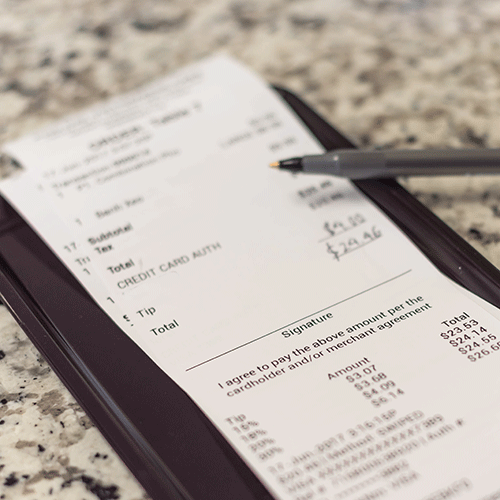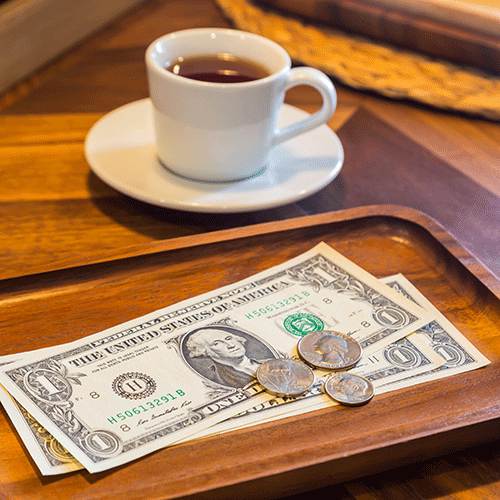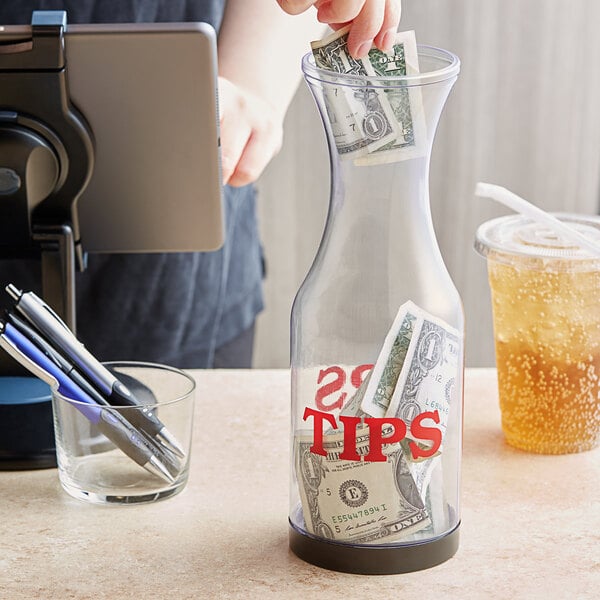
Whether received directly from a customer, through a tip pool, or added on a credit card slip, the Internal Revenue Service (IRS) considers all tips you earn as reportable income, subject to federal and often state income taxes. For restaurant employees and operators, navigating the rules for tracking and reporting this income is a critical part of financial compliance. This guide breaks down the essential procedures for both staff and management, detailing how tips are taxed and the correct way to report them to avoid penalties and ensure accurate paychecks and filings.
What Are Tips?
In the foodservice industry, tips are discretionary, or optional, payments customers make directly to an employee for services provided. This gratuity can be given in cash left on a table, added to a credit or debit card transaction, or through a digital payment app. For tax purposes, these voluntary payments are not considered gifts but are a form of employee compensation.

Are Tips Taxed?
All tips you receive are taxable income. Cash tips (including card tips paid out by your employer and tip-pool distributions) totaling $20 or more in a month from a single employer are also subject to Social Security and Medicare tax and must be reported to your employer. Non-cash tips (such as tickets or other items of value) are taxable for income tax purposes but are not subject to Social Security and Medicare tax and are not reported to your employer.
Are Shared Tips Taxed?
Tips you receive from a tip-sharing arrangement, such as a tip pool where contributions are distributed among eligible staff like servers, bussers, and bartenders, are fully taxable to you as the recipient. You are required to report only the actual amount you receive personally, not the total amount you contributed to the pool. The tax liability follows the money to the employee who ultimately keeps it.
Do Employers Pay Taxes on Tips?
Employers have specific payroll tax responsibilities for their employees' reported tips. Restaurants are required to pay a matching portion of FICA taxes, contributing 7.65% for Social Security and Medicare on every dollar of tip income reported by their staff. Employers must also pay Federal Unemployment Tax (FUTA) on these tips, as the IRS considers them part of an employee's taxable wages.
Taxing Tips vs Service Charges
Tips are voluntary customer payments and are taxed differently from service charges, which are mandatory fees treated as regular wages. Under IRS rules, a payment is a tip only if the customer decides whether to pay, how much to pay, and who receives it, otherwise it’s a service charge. Voluntary tips are taxable to employees, and cash/charged tips of $20+ in a month per employer are also subject to FICA and must be reported to the employer, non-cash tips are taxable for income tax but not FICA. Service charges are employer-paid wages. You need to run them through payroll with income tax, Social Security, and Medicare withholding, and show them on the employee’s W-2 as wages, not as tips.
How Does the 2025 One Big Beautiful Bill Act Affect Tips?
The One Big Beautiful Bill Act lets many tipped workers deduct up to $25,000 of qualified tips from federal taxable income for tax years 2025–2028, but it does not eliminate payroll taxes or the duty to track and report tips. For restaurants, day-to-day tip handling stays the same, what changes is how some employees may deduct properly reported tips on their personal returns.
- Creates a Temporary Federal Deduction for “Qualified Tips”: Employees in IRS-listed tipped occupations can deduct up to $25,000 of voluntary, customer-paid tips that are correctly reported on a W-2, 1099, or Form 4137, but the deduction phases out at higher incomes. Restaurants don’t claim this deduction, but accurate reporting enables staff to use it.
- Does Not Change Social Security/Medicare (FICA) on Tips: Cash and charged tips of $20+ in a month per employer remain wages for FICA, so employers must withhold the employee share and pay the matching employer share as before. This new deduction affects federal income tax only, after reporting.
- Keeps the Tip vs. Service-Charge Line Intact: Automatic gratuities and service fees are still treated as wages, not tips, so they don’t qualify for the deduction, label them clearly in your POS and on receipts.
- Adds New Information-Reporting Expectations: Employers and payors are expected to separately identify certain cash tips and the worker’s tipped occupation on information returns. The IRS has granted penalty relief for 2025 while systems update.
- Leaves Employee and Employer Recordkeeping in Place: When you file your annual personal income tax return, the total tips you reported to your employer must be included on your Form 1040. If you received any tips you did not report to your employer, you must also declare these and may need to file Form 4137 to pay the Social Security and Medicare taxes on them.
Reporting Tips
Accurate tip reporting is a fundamental requirement for both restaurant employees and the establishment itself. Employees bear the responsibility for tracking and declaring their gratuities, while employers must handle the withholding, matching, and filing of associated payroll taxes. Failure on either side can lead to IRS penalties, making a clear understanding of the process essential for compliance. Your primary responsibilities include:
How to Report Tips as an Employee

As a foodservice employee, you are legally required to report all your tips, cash, credit card, and shared, to your employer on a monthly basis. This allows your employer to withhold the correct federal income, Social Security, and Medicare taxes from your paycheck, ensuring your tax obligations are met throughout the year. Maintaining your own daily tip record is crucial for accuracy.
- Keeping a Daily Log: Document all tips you receive each day, using Form 4070A (the IRS Employee's Daily Tip Record) or your own system with the same details: date, cash tips, credit card tips, and tips paid out to other staff.
- Submitting a Monthly Report: Provide a tip report to your employer by the 10th of the following month, using Form 4070 (Employee's Report of Tips to Employer). You must report if your total tips for the month are $20 or more.
- Reporting All Tips on Your Tax Return: When you file your annual personal income tax return, the total tips you reported to your employer must be included on your Form 1040. If you received any tips you did not report to your employer, you must also declare these and may need to file Form 4137 to pay the Social Security and Medicare taxes on them.
How to Report Tips as an Employer
Restaurant operators must collect tip reports from employees, withhold taxes accordingly, and report the totals to the IRS. Your role is to act as a facilitator, ensuring the tip income flows correctly into the tax system through your standard payroll processing while maintaining specific records for IRS verification. Your key duties involve:
- Collecting Employee Tip Reports: Ensure you receive Form 4070 or its equivalent from all tipped employees by the 10th of each month.
- Withholding and Paying Payroll Taxes: Withhold federal income tax and the employee's share of Social Security and Medicare taxes (7.65%) from their regular wages and reported tips. You must also pay the matching employer's share of Social Security and Medicare taxes (7.65%) from your own funds.
- Filing Form 8027: File Form 8027 for each large food or beverage establishment by the last day of February if filing on paper, or by March 31 if filing electronically.
- Reporting on W-2s: Include all reported tip income in the "Wages, tips, other compensation" box on each employee's Form W-2 for the year.
What Are Allocated Tips?
Allocated tips are a figure reported by the employer to the IRS on Form 8027 and on an employee's W-2 when the total tips reported by staff fall short of a certain threshold. This amount represents the IRS's estimate of what an employee likely received based on a formula, which typically uses the establishment's gross receipts and a mandated tip rate of 8%. Allocated tips appear in Box 8 of Form W-2 and aren’t included in Box 1 wages or withholding. On your tax return, you generally add allocated tips to income and compute any Social Security/Medicare due on Form 4137, unless your own records substantiate that you received less in tips than the allocated amount. Accurate daily reporting is the best defense against allocation.
Penalty for Not Reporting Tips

Failing to accurately report tip income can trigger significant IRS penalties for both employees and restaurant owners. The consequences extend beyond simple interest charges to include substantial fines based on the unpaid tax amount. For the business, lax tip reporting compliance can also lead to costly payroll tax audits.
- Compromised Loan and Benefit Eligibility: For employees, underreporting income leads to an artificially low earnings record, which can reduce their qualification for mortgages, car loans, unemployment benefits, and future Social Security retirement payouts.
- A 50% Penalty on FICA Taxes: Employees who do not report all their tips to their employer must pay the full Social Security and Medicare tax owed on that unreported income, plus an additional penalty of 50% of that tax when they file their annual return using IRS Form 4137.
- Fines and Criminal Charges for Employers: Restaurant owners who willfully fail to report tips may face penalties for failing to furnish W-2s, with fines per form, and could be subject to criminal prosecution for tax evasion.
Tip Tax FAQ
Below, we answer some frequently asked questions about how tips are taxed and reported:
Are Cash Tips Taxable?
Cash tips are fully taxable. The IRS treats all cash received as gratuity for services as reportable income. You must include these amounts in your daily record and report them to your employer if they total $20 or more in a month.
What Percentage of Tips Do Servers Have to Claim?
There is no set percentage servers are required to claim, as the law mandates reporting 100% of all tips received. Some restaurants may use a point-of-sale system that suggests a tip amount based on sales, but your actual legal obligation is to report the full amount you earn, not an estimated percentage.
Are Tips Considered Income?
Tips are compensation subject to federal income tax. For any server or bartender, tips are not optional gifts but a direct form of compensation for work performed, making them subject to federal income tax, just like a regular paycheck.
Declared Tips Meaning
Declared tips are the gratuities you formally report to your employer and the IRS. When you "declare" your tips, you are providing a precise record of your cash and credit card earnings, which your employer then uses to withhold the correct taxes from your paycheck and report your true earnings to the government at year's end.
Mastering the flow of tip income, from defining what qualifies to executing precise reporting procedures, is a critical component of financial health. Adhering to these guidelines ensures your business remains compliant, safeguards your staff from unexpected tax liabilities, and fosters a transparent workplace. Treating gratuities with the same diligence as any other revenue stream is the most effective strategy for protecting both your establishment and your employees.





